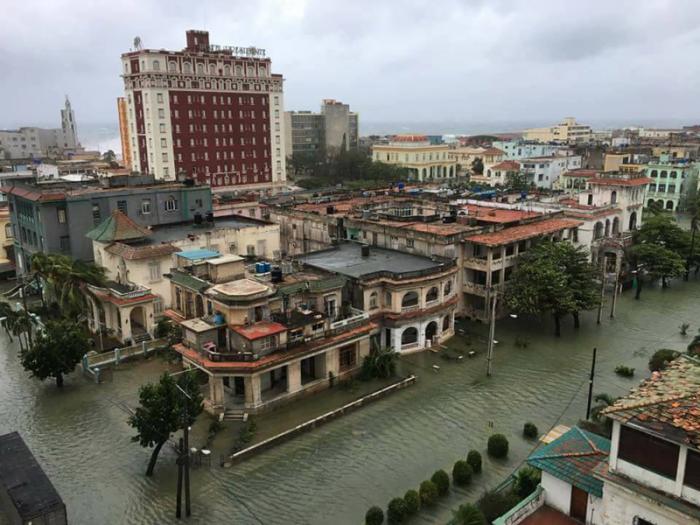For three days, beginning Sep 7, Hurricane Irma (the largest and most sustained hurricane ever recorded in the Atlantic; and the first Category 5 hurricane to hit Cuba in 85 years) came ashore over Cayo Coco and tore along Cuba’s northern shore, causing catastrophic damage, after a week-long rampage westward through the Caribbean.
Much of Cuba’s hotel infrastructure along the north coast tourist resorts was destroyed. So, too, the airport at Cayo Coco. And much of the region’s ancillary infrastructure, including thousands of homes and other buildings. In Havana, streets near the Atlantic shoreline were flooded, and several houses were toppled. along with countless trees and other structures.

THE GOOD NEWS
Fortunately, so far Cuba has not reported anyone killed… Havana’s hotels suffered little damage… And most of eastern Cuba was spared significant damage, as it true of cities along the south coast, such as Cienfuegos and Trinidad.
Cuba has an exemplary Civil Defense program and a history of governmental action to help the affected population recover.
The government prepared by staging emergency supplies and building equipment ahead of the arrival of Irma, and crews were put to work to repair essential infrastructure even before the storm had departed.
Alongside ensuring that essential infrastructure (water, electricity, etc.) is rapidly repaired, I expect the government to prioritize rebuilding the hotel infrastructure as quickly as possible. Russian president Vladimir Putin has promised economic aid to that effect. And the foreign hotel management groups, which have a huge economic stake, will surely play their part too.
Cuba has been criticized in recent years for jacking up hotel prices beyond reason, notably in Havana. That’s the major reason people-to-people programs offered for U.S. citizens may seem expensive. I have absolutely no doubt that tourist numbers will crash, effective immediately (three-quarters of all Cuba’s visitors stay at the northern offshore resorts). And that the Cuban government will respond by radically reducing its hotel pricing.
U.S. citizens should be the beneficiaries.
EXAMPLE OF HURRICANE MATTHEW
In November 2016, the eye of Hurricane Matthew came ashore at Baracoa, wrecking much of Cuba’s original town (founded in 1511). Reports of the damage were grim. I visited only two months later… and was delighted to discover that almost every house that had had its roof torn off had already been fixed with new zinc roof supplied by the government. Every single piece of rubble had been removed. And the only visible sign that a major hurricane had passed through were the many trees felled to the ground.
It was a remarkable statement to the country’s resilience, and to the Cuban government’s capacity to restore services and infrastructure.

WHY YOU SHOULD TRAVEL TO CUBA FOLLOWING HURRICANE IRMA
The task of recovery from Hurricane Irma will be many times harder, and longer, than that of Hurricane Matthew.
But the flood waters will recede from Havana within days. Essential infrastructure will soon be functioning again. And by the time the next ‘tourist season’ begins in November, visitors to areas other than the north shore resorts should experience the same pleasant surprise that I did in Baracoa in January 2017.
Moreover, my people-to-people programs offered by National Geographic Expeditions should not be affected at all. Our itinerary visits Havana, Cienfuegos and Trinidad… the latter two cities on the south coast. Likewise my photo tours with Tom Brichta, Jim Cline Photo Tours, and Lumaria Workshops.
The route of my Western Cuba motorcycle tour offered by Edelweiss Bike Travel similarly also concentrates on Viñales (west of Havana) plus Cienfuegos, Trinidad and the Bay of Pigs. And I am already in discussion with Edelweiss to reroute our longer tours to avoid the north coast resorts.
And here’s the main reason why you SHOULD travel to Cuba… to help the Cubans recover from this tragedy by supporting them economically.
Many of the Cubans we’ll interact with on my people-to-people programs are independently employed artists, musicians, restaurateurs and owners of bed & breakfasts (casas particulares). They rely on our income. They rely on us!
Plus, Hurricane Irma will have done nothing to diminish the gaiety, community spirit, and friendliness of the Cuban people and their remarkable, fascinating culture.
